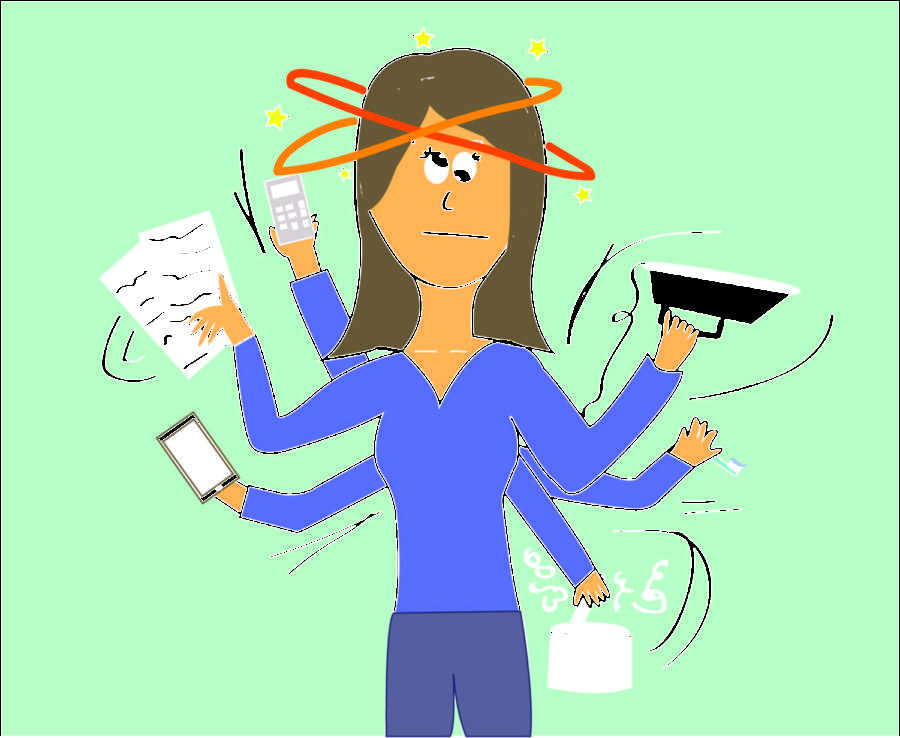Ward: Multitasking leads to more negatives than it’s worth
Adolescents and young adults multitask because they have a dwindling capacity for patience and a growing one for procrastination.
November 17, 2014
Right now as you are reading this column your temporal lobe, frontal lobe, angular gyrus and supramarginal gyrus are all hard at work, just by comprehending these words alone. But chances are that this column is not the only thing you are making your brain sort through.
More than likely your phone is on-hand; perhaps you’re even breaking up the task of reading with sporadic text replies or tweets. Or maybe you’re getting really fancy and blocking out the world around you with music while you read which brings the cerebrum, cerebellum and limbic system into the mix. Or you could be doing all three.
No matter what combination is your favorite multitasking has become one of this generation’s greatest pastimes under the premise that it helps us get things done faster.
Unfortunately that might not be true — multitasking may be the source of more cons than pros.
The brain is a wonderfully complex organ that most of us truly don’t understand which is why we believe multitasking is actually a thing in the first place. While you are reading this, listening to music, texting and watching the passersby, you are under the illusion that you’re doing it all at once.
However, according to a study, you’re really not. The reality is that while you think that your brain is able to do it all simultaneously it is actually ordering the activities and doing them one at a time.
The term should really be “chunking” not “multitasking,” but our brain does it so quickly that it does in fact feel like you’re doing it all. Yet another testimonial to how amazing the human brain actually is.
With this knowledge at our disposal, one may logically begin to wonder how the brain copes with this insane amount of information being constantly fed into it and that is where the negative aspects of multitasking being to emerge.
The same study highlighted a link between the loss of gray matter in one particular area of the brain and consistent use of several media devices.
This area is called Broadmann’s Area 10, which is located in the brain’s anterior frontal cortex. In an interview, Jordan Grafman, an author of the study, explained that this is the area of the brain which “allows you to leave something when it’s incomplete and return to the same place and continue from there.” This area of the brain is what creates the illusion that we are multitasking when we are actually organizing things into a mental to-do list.
Another area of the brain that has been linked to negative effects of multitasking is the anterior cingulate cortex, which is responsible for cognitive and emotional control functions.
This information backs up previous research claiming that multitasking leads to anxiety, depression and decreased attention while dealing with a distraction because this area of the brain which is being impacted is responsible for emotional control.
This information paired with the fact that teens, who are going through emotional turmoil already from puberty and whatnot, are the main multitaskers of the world could raise questions as to how much additional emotional damage could be done.
However, despite news reports and studies, adolescents and young adults continue to multitask because we have a dwindling capacity for patience and a growing one for procrastination.
We must get our homework done that’s due at 11:59 p.m., live-tweet “American Horror Story,” open snaps from Snapchat and put just enough effort into the conversation your roommate is having with you so that they think you’re really listening to them.
We think doing all of this at once will help us get it done faster and with the same amount of accuracy as we would had we done it sans distractions, but here is the final nail in the multitasking coffin; we can’t. David E. Meyer, director of the Brain, Cognition and Action Laboratory at the University of Michigan said that the more tasks you do at one time increases then number of errors you’ll produce.
This means that if you are a conscience student you will just have to go back and do it all over again later, which effectively undoes all the skillfully orchestrated multitasking you used to try and save time with in the first place.

















